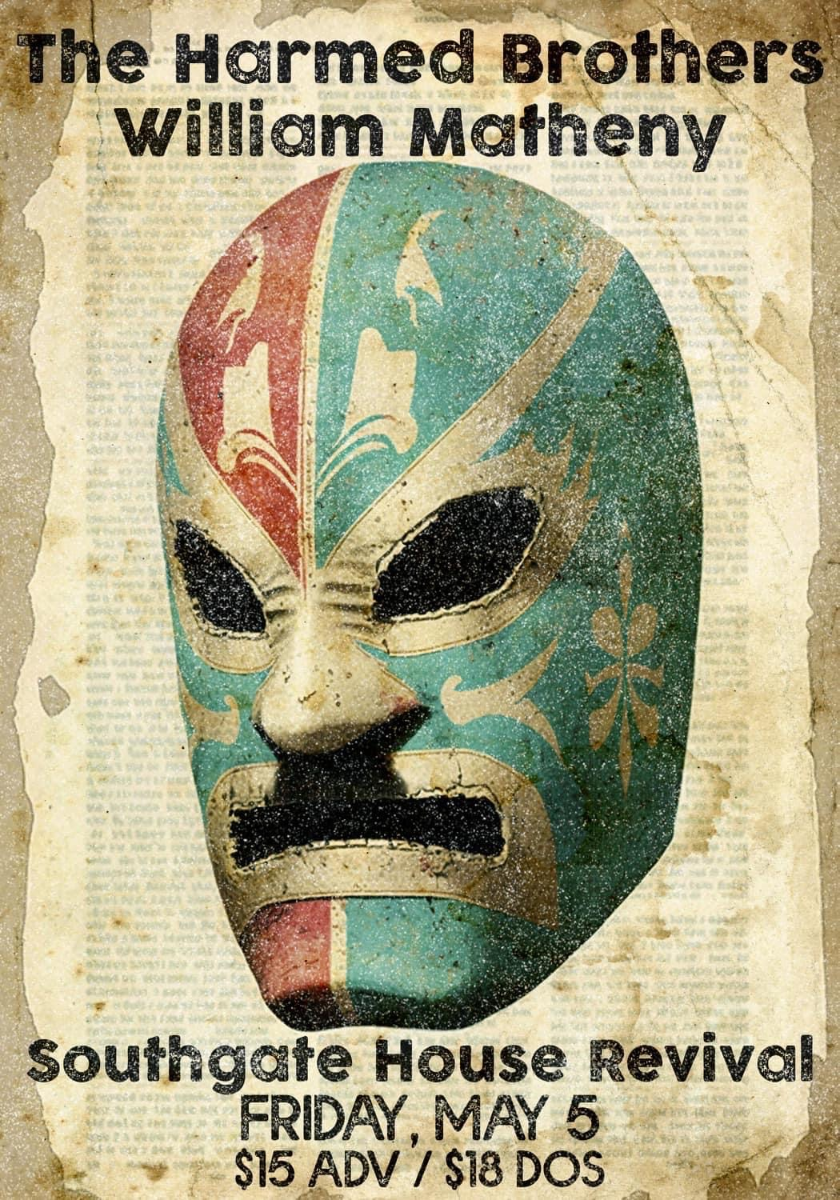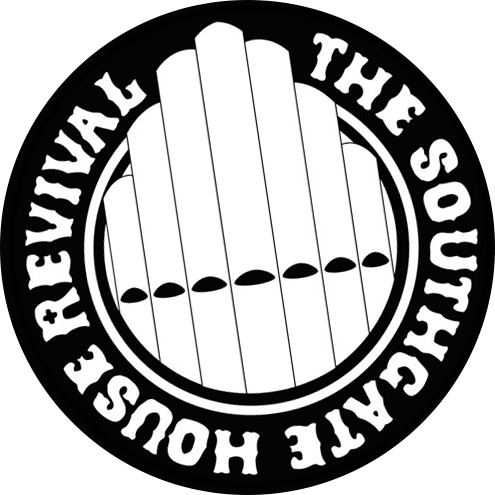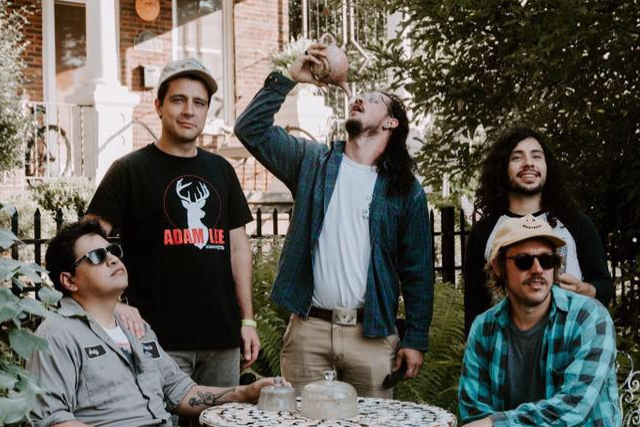
“Cerebral alt. country from an unusually versatile singer.” — Rolling Stone “William Matheny is quickly becoming one of independent country music’s most exciting emerging artists.” — American Songwriter

“Y'know, I once had a birthright/ but I traded it in/ For a fine collection/ Of motel pens”
Let me tell you an anecdote about William Matheny. And no, this is not the 5:15 AM drive to the Albany Airport when we both were drinking Genesee beer and black coffee because we were both thinking correctly at that hour. More on that later. It was before I really knew William, but the moment when I knew that he was great. Envision: A punk rock club in Washington, DC, its inhabitants and paid customers. Who knows why and how he had been booked? A songwriter from Mannington, West Virginia stepping into the lair of upper-crust, judgment-packed DC punks with their Fugazi-leftover orthodoxies in their wildly provincial scene. He had fifteen minutes, a Vox amp, a telecaster and no one interested in the audience. I live in DC and I would have fled. There was a 10,000% chance that the next band up was going to have a spiel about gentrification and then play “angular riffs.” Billy -- I can call him that, you can’t -- played a solo set. He played loud. He played “Out For Revenge” and “29 Candles” and “Teenage Bones” and the other great songs which you may not have heard on his debut LP. Over the course of that short set he first brought that crowd to heel and then brought the crowd around. By the end the applause was thick and the appreciation unmistakable. He did it in DC. He can do it anywhere.
But let’s talk about the other thing with the beers and the coffee and Albany. You need to know that William Matheny and I have been through some things together. We’ve seen parts of the world that I was sure existed only in Elmore Leonard novels. When I needed to pull over on the Cross-Bronx Expressway to throw up in a plastic trash bag, he was my driver and bag provider. We made it to the Bowery Ballroom an hour later for soundcheck and everything went great. William Matheny is the lead guitarist in my band the Paranoid Style, in addition to his other obligations. William Matheny is a man that makes things happen.
William Matheny may be the best songwriter working, and is at a minimum the best songwriter you might have never heard of. For those who haven’t had that good fortune, let's go, as Warner Wolfe used to say, to the videotape. Consider his 2018 standout single “Christian Name,” which is like Tom Petty’s “Runnin’ Down A Dream” if it had been “Runnin’ Down A Nightmare.” Or reckon with “Living Half to Death,” the comically terrifying instant classic from 2017’s Strange Constellations in which he apologizes for “abusing all his friendships and drinking all their beer.”
Over the past four years, he has assembled a wondrous catalog which situates itself amongst the indelible tradition of roots-rock misfits like Guy Clark and Lowell George, with just enough Jackson Browne-craft and Springsteen-triumphalism to make the thing potentially huge. You can’t talk about Matheny without talking about West Virginia, although it is sometimes true that he would prefer not to discuss it. Matheny is from Mannington, population smaller than your average small town. Like most of the state, Mannington fought on the side of the Union in the Civil War and represented a crucial strategic stronghold as one of the stops on the B&O Railroad. The correct side, not that it helped all that much. They say history is written by the winners, but in spite of upholding the Union, history was not written by Mannington. Heavy industry: logging and coal. An oil boom in the 1910s. Comfortable lives and then the Great Depression. Bankers and foreclosures. History was written by Mannington and then history was written on Mannington. That grand old feeling, indeed.
And while he might not always want to talk about it, West Virginia is a central character in Matheny’s songs. The dirty snow falling on the Coffindaffer Crosses, the Moundsville guards, the doomed shout-outs to Stoney Cooper, the unhappily married lovers at the Elks Lodge and the tapes from Go-Mart melting on the dashboard all enforce the notion that the man can travel wide and far from Mannington, but Mannington never leaves the man. Like so many before him -- Elvis from Tupelo or the Mekons from Leeds -- he can check out any time he likes. But he can never et cetera, et cetera. Or as he once elegantly put it, “Moon over Mannington/ Moon over Spain/ Moon over happiness/ Moon over pain.”
Two things occur to you when you realize that your lead guitar player has made a series of incredible, self-evidently life-changing records. First of all you couldn't be more proud. Secondly you wonder: “Wait -- am I going to lose my lead guitar player?” Ronnie Wood once memorably titled his own solo collection: I Got My Own Album To Do. Fortunately, that turned out to only be half-true -- or at least not career-altering -- and soon enough Ronnie was re-ensconced into the “ancient art of weaving” alongside Keith and Mick. Will Billy and I weave together again? I know we will, but we both know things are likely to be materially different once the world experiences Strange Constellations, Moon Over Kenova and his forthcoming third record. It’s like he sings on “Late Blooming Forever:”
“Oh dear friends and gentle hearts/ That I've known along the way/ I've been late blooming/ but I think it's gonna happen any day.”
It’s happened.
-Elizabeth Nelson, Durham, NC, 2nd November 2021
Nestled between the rolling farmland of Oregon’s Willamette Valley and the impossibly tall trees further south, the gold and timber town of Cottage Grove has always drawn an eclectic mix of dreamers, drifters and prophets to its downtown Main Street.
For about a decade now, many of these frontier misfits have gathered to carouse and quench their thirst at the Axe & Fiddle Pub, and if the Harmed Brothers owe the path they’ve forged these past few years to any particular beer-soaked barroom along the way, it’s got to be the Fiddle.
It’s more than likely the place where, in early 2009, singer/songwriter Ray Vietti — already the veteran of one ambitious but ill-fated musical dream — first encountered Alex Salcido, and it’s probably where the two musicians first decided to jam. Soon enough, Vietti would come to recognize Salcido as a kindred spirit in both vision and song, and the young tunesmith would help write the Harmed Brothers saga with an insightful, often wistful lyrical and instrumental voice that offers a fitting complement to Vietti’s gritty baritone and powerful chords.
The fledgling duo paused in the Grove for a moment, gathering steam, trading tunes and talking possibilities, performing for crowds there and in nearby Eugene before striking out for the open road — their second home ever since and the undeniable inspiration for many of the songs and stories to follow.
Soon after their first meeting, Vietti and Salcido quickly recorded and released their independent debut, “All The Lies You Wanna Hear,” and began to tell the tales of love, loss, hard-drinking and redemption that have since endeared them to legions of fans and fellow musicians.
In 2011, the Harmed Brothers’ evolution as songwriters and as a touring act showed through with their sophomore effort, “Come Morning,” a release from Oklahoma-based Lackpro Records that sways with the rhythms of the road and the forlorn waltzes of a nation’s dive bars and dance halls.
These days, they call it “indiegrass,” the rustic American musical blend that celebrates and chronicles the physical and emotional gauntlet the Harmed Brothers have always ridden, zigzagging endlessly in vans across the nation. It’s an inclusive sound, the melding of two unique voices adorned each night with the contributions of the many pickers, singers and songwriters the Brothers have encountered in their travels.
It’s known as the “Harmed Family Roadshow,” and it’s as much a nightly happening as a sound in constant flux — from a jangly acoustic three-piece one night to a manic mariachi string band the next, a wall of rock-and-roll bombast at times giving way to the whispered incantations of two folk troubadours, often within the span of a single song.
Two years more on the road brought a European tour and a host of new fans, and by 2013, Salcido and Vietti stood poised to offer their most ambitious album to date. “Better Days,” recorded in a St. Louis studio and released by Portland, Oregon-based Fluff and Gravy Records, draws inspiration from themes of personal growth and redemption as well as the hurdles, heartbreaks and mishaps that have always accompanied the traveler’s search for enlightenment. Praised as “honest and inspired, devoid of posturing and pretense,” “Better Days” features some of the Harmed Brothers’ deepest grooves and their most plaintive and enduring tunes to date.
In the winter of 2015, the “Harmed Family Roadshow” gathered together in all its tattered glory in Portland, Oregon, the Brothers’ adopted home and headquarters, to begin amassing the riffs and recollections that will become their definitive recorded work. Due from Fluff and Gravy in early 2016, the album draws from the tales and talents of many of the duo’s closest collaborators and dearest friends. It promises textures never before captured on a Harmed Brothers release, brought together by the two visions and voices that propel the band toward an inspired and undeniable future.


